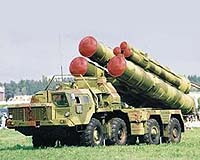So, Putin, I mean Russia, will not go along with the U.S. demand for sanctions against Iran at this time, but it is keeping an eye on them.
Great! I wonder what the world will do once it is confirmed that Iran possesses a nuclear weapon? The president of Iran has made it known of his dislike for Israel and his wanting to destroy this Jewish state. What will Israel do? What kind of balls does the government of the U.S. of A. have to deal with a nuclear capable Iran? How far will we go to prevent the exploitation of this weapon by fundamentalist people intent on destroying anything, anyone that is not a member of Islam?
Saudi Arabia is doing its part in trying to broker a deal to buy missile systems from Russia in exchange for the ex-soviet union member not to sell any missile system package to Iran. This is to delay Israels intent on destroying the nuclear facilities in Iran before they finishing making a nuclear bomb. After all, what else can Israel do to stop the Iranians from producing and delivering a nuclear weapon first?
Countries do not want a major conflict in this region, but I fear there will be a meltdown within a couple of years when everyone has the weapons in hand to do what they have been planning for years. Maybe the year 2012 is important?
lakotahope
~~~~~~~~~~~~~~~~~~~~~~~~~~~~~~~~~~~~~~~~~~~~~~~~~~~~~~~~~~~~~~~~~~~~
BBC News
US Secretary of State Hillary Clinton has told the BBC that Russia now recognises the threat posed by Iran.
Wrapping up a European tour in Moscow, Mrs Clinton said Russian leaders had in private said they were ready to act if Tehran did not meet its obligations.
But Prime Minister Vladimir Putin, on a visit to China, said it was too early to talk about sanctions on Iran.
Russian Foreign Minister Sergei Lavrov said on Tuesday that threats of sanctions were counter-productive.
Iran denies allegations by the US, EU and Israel that it is trying to build the bomb under cover of a civilian nuclear energy programme.
Mrs Clinton told the BBC on Wednesday that Russia in the past six months had "moved tremendously" to acknowledge the threat of Iran's programme.
 Vladimir Putin Russian prime minister |
She said Russian officials, in private talks, had recognised the need to act if diplomacy failed.
"We are in total agreement on all of that," Mrs Clinton told the BBC.
"And we are also in agreement that if our diplomatic engagement is not successful then we have to look at other measures to take, including sanctions to try to pressure the Iranians."
As a permanent UN Security Council member, Russia would need to back any fresh sanctions against Iran.
At the start of this month, Iran agreed at a meeting in Geneva to allow UN inspectors into a previously undisclosed nuclear site near its holy city of Qom, and to send low-enriched uranium abroad for enrichment to a higher level.
'Buying time'
Mrs Clinton acknowledged to the BBC that Tehran had bought itself more time with this move.
But she said Iran had also made commitments which the Russians and the Chinese now expected them to fulfil.
However, wrapping up a visit to Beijing, Vladimir Putin said talk of sanctions was premature.
"I believe it's too early to speak of them," Russia's prime minister told media, reports AFP news agency.
"There is no need to scare the Iranians. There is a need to reach agreements."
After Moscow, Mrs Clinton headed for Kazan, capital of the religiously and ethnically diverse region of Tatarstan, east of Moscow.
 The US has been trying to "reset" relations with Russia |
Her five-day European trip included stops in Zurich, London and Belfast.
US President Barack Obama, who met Russian President Dmitry Medvedev in July, has pledged to reset relations with Moscow.
Mr Obama, for his part, has met a key Russian demand to scrap plans to deploy interceptor missiles in Poland and a radar station in the Czech Republic as part of a US missile defence system in Europe.
The US administration insisted it did not expect concessions in return.
But Washington has called on Moscow to support, or at least not oppose, the idea of tougher sanctions on Iran if it fails to live up to its international obligations.
The council wants Iran to end uranium enrichment and has approved three rounds of sanctions - including bans on Iran's arms exports and all trade in nuclear material.







